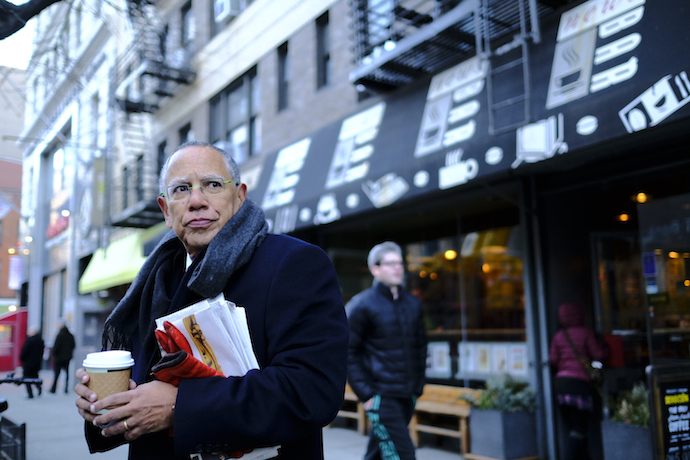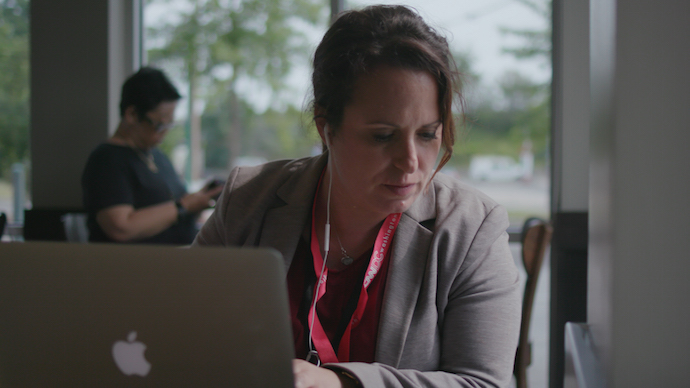The Fourth Estate, a four-part docuseries from Academy Award-nominated filmmaker, Liz Garbus, which premieres on Showtime Sunday, opens with the ominous swearing in of President Donald Trump, in January of last year. The score is thundering. And the White House, framed in stark contrast against an overcast sky, emerges in the foreground as a long-held symbol of light, perhaps, versus a gathering storm of darkness.
“What a story,” Dean Baquet, the executive editor of The New York Times, says, as if in disbelief. “What a fucking story.”
Yes: what a fucking story. If the last year and a half of Trump has proven anything, it’s proven itself as a good fucking story, despite being a really awful fucking story—a maddening, disheartening, frightening, frustrating, thrilling, fucking story. Both stranger than fiction, and more absurd than any satire, it’s been, for the conscientious amongst us, an unending reality show we can’t help but watch, no matter how much we might want to turn away. After all, we need to know: what will happen next?

Central to this story has been The New York Times—better known to some as “the Failing New York Times”—which has become both a character in the play, as well as one of its primary writers. The paper’s coverage of the Trump administration is the focus of The Fourth Estate, and the Times granted Garbus and her crew unprecedented access to the newsroom and its stable of reporters and editors.
“It’s very easy to attack a nameless faceless institution,” Garbus explains over the phone, regarding the impetus for the documentary. “But when you see the men and women who work there, and they’re human beings, and they don’t have horns on their heads, and they wake up and they have kids and they have everything you’ve got, it becomes harder to demonize them.”
One of the greatest challenges Garbus faced when creating the series—the most expansive production of her career—was figuring out which of these human beings to follow. And which stories to hone in on. She didn’t want the project to serve as a recap of last year’s news; that would be, as Garbus jokes, a “100 hour documentary.” Thus, she primarily focused on a cast of characters—including Trump whisperer Maggie Haberman, her reporting partner, Glenn Thrush, Washington investigations editor Mark Mazetti, Washington bureau chief Elisabeth Bumiller, host of The Daily, Michael Barbaro, and executive editor Dean Baquet—and filtered the news through them.
Juxtaposed with The New York Times coverage of the Trump administration is the meta-narrative of The New York Times itself—its tricky transition from print to digital, and from layers of editors to more on-the-ground reporters, which resulted in a multitude of newsroom buyouts last May. Looming, too, is the constant threat of getting scooped by The Washington Post—a paper flooded with resources, thanks to its owner, Amazon founder Jeff Bezos.

All of these factors—an industry in flux, an institution under attack—made the newsroom an understandably electric place to be.
“Whenever there was news breaking and we weren’t in the newsroom, we would be jonesing,” Garbus recalls. Her sentiment is reflected by the reporters themselves, who approach each new “holy shit” moment—the Comey firing, the “many sides” speech, the Papadopoulos charges—with solemnity, but also excitement.
“I’m so tired,” Maggie Haberman admits, ruefully, in the first episode. “But I also don’t really know how to stop working.”
More than anything else, the docuseries captures the dissonance of the Times reporter in the Trump era: the exhilaration and sobriety with which they chase and report a story, combined with the wariness they must feel as concerned citizens in an unprecedented era of American politics. Because of the ceaseless demands of the 24-hour news cycle, it’s easy to forget there are actual people behind the curtain, pulling the strings, hitting "publish." The most compelling moments of The Fourth Estate may be the decidedly analog minutiae of the newsroom in the digital age—editors looking over other reporters shoulder as they type, multiple writers tweaking the wording of a lede, Glenn Thrush taking a call under his desk, Maggie Haberman casually chatting with President Trump on the phone at her cubicle, reporter Jeremy Peters bringing Steve Bannon a kombucha at their weekly meeting. Are these people fallible? Certainly. But they’re fallible mostly insofar as they’re also human.
I ask Garbus what it was like to be a fly on the wall at the Times during the year’s biggest news stories, alongside the reporters and editors tasked with breaking them to the public. She says it was thrilling, to be sure, but implies that it was grounding as well.
“A lot of the folks in the Washington bureau, especially those on the National Security teams, they’ve covered wars before—they’ve been in some really volatile situations,” Garbus says. “In some ways, it was very comforting to be around those who were connecting the dots and putting it all together.”






